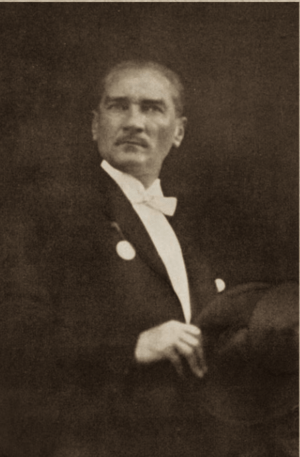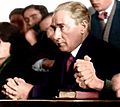Mustafa Kemal Atatürk facts for kids
Quick facts for kids
Gazi Mustafa Kemal Pasha (until 1934)
Kemal Atatürk (since 1934) |
|
|---|---|
 |
|
| 1st President of Turkey | |
| In office 29 October 1923 – 10 November 1938 |
|
| Prime Minister | İsmet İnönü Fethi Okyar Celâl Bayar |
| Preceded by | Office established |
| Succeeded by | İsmet İnönü |
| 1st Prime Minister of the Government of the Grand National Assembly | |
| In office 3 May 1920 – 24 January 1921 |
|
| Deputy | Fevzi Çakmak |
| Preceded by | Office established |
| Succeeded by | Fevzi Çakmak |
| 1st Speaker of the Grand National Assembly of Turkey | |
| In office 24 April 1920 – 29 October 1923 |
|
| Preceded by | Office established |
| Succeeded by | Fethi Okyar |
| 1st Leader of the Republican People's Party | |
| In office 9 September 1923 – 10 November 1938 |
|
| Preceded by | Office established |
| Succeeded by | İsmet İnönü |
| Personal details | |
| Born |
Ali Rıza oğlu Mustafa
(Mustafa son of Ali Rıza) 1881 Salonica, Ottoman Macedonia, Ottoman Empire (now Thessaloniki, Greece) |
| Died | 10 November 1938 (aged 57) Dolmabahçe Palace, Istanbul, Turkey |
| Resting place | Ethnography Museum, Ankara (21 November 1938 – 10 November 1953) Anıtkabir, Ankara (from 10 November 1953) |
| Nationality | Turkish |
| Political party | Republican People's Party |
| Other political affiliations |
Motherland and Liberty Committee of Union and Progress (He left it.) Association for the Defense of the Rights of Anatolia and Rumelia (Republican People's Party after 1923.) |
| Spouse | Latife Uşaklıgil (1923–25) |
| Parents | Ali Rıza Efendi Zübeyde Hanım |
| Relatives | Makbule Atadan (sister) |
| Awards | List (24 medals) |
| Signature | |
| Military service | |
| Allegiance | |
| Branch/service | |
| Rank | Major General (Ottoman Army) Marshal (Turkish Army) |
| Commands | 19th Division 16th Corps 2nd Army 7th Army Yildirim Army Group Army of the Grand National Assembly |
| Battles/wars |
List
Italo-Turkish War
Tobruk Derna Balkan Wars Bulair Adrianople II World War I Anzac Cove Baby 700 No.3 Post Nek Chunuk Bair Scimitar Hill Hill 60 Suvla Bay Sari Bair Bitlis Southern Palestine Transjordan III Nablus Megiddo Jisr ed Damieh Samakh Damascus Jisr Benat Yakub Kiswe Kaukab Pursuit to Haritan Khan Ayash Aleppo Charge at Haritan Greco-Turkish War Sakarya Great Offensive |
|
Graphical timeline
Detailed chronology
|
|
Kemal Atatürk (or alternatively written as Kamâl Atatürk, Mustafa Kemal Pasha until 1934, commonly referred to as Mustafa Kemal Atatürk; 1881 – 10 November 1938) was a Turkish field marshal and statesman who became the first President of Turkey from 1923 until his death in 1938. He is known for being a leader who freed his people from being controlled by other countries and later for starting changes that founded Turkish nation state based on social and economic nationalism, more modern and similar to Western civilization, mainly France (such as the French model of secularism called laïcité).
Mustafa Kemal Atatürk was born under the name Mustafa in 1881. His birth place was in Salonika, Macedonia (now Thessaloniki, Greece). Salonika was part of the Ottoman Empire at that time. He took the name Kemal as a schoolboy and Atatürk (which means Father-Turk) when he was president. His father's name was Ali Rıza Efendi. His mother's name was Zübeyde Hanım. He also had a sister whose name was Makbule (Atadan). He became an army officer and the most successful general officer of the empire in World War I, fighting in Gallipoli.
When the Ottoman Empire was ended after the war, Atatürk organized a nationalist movement that created the new, secular, Republic of Turkey. This meant that the country's government was no longer led by hereditary or religious leaders. Visitors to Turkey are often surprised by the importance given to Atatürk in present-day Turkey.
Few countries have such a person in their history. He was a successful military commander, and later established a democratic constitution and put in place changes that set Turkey on the road to becoming a new and developing nation. He inspired many later leaders like Habib Bourguiba, Gamal Abdel Nasser, Sukarno, and Mohammad Ali Jinnah.
His six principles still serve today as a sign post for establishing a democratic government:
- Republicanism: Replacing the hereditary monarchy with an elected parliament.
- Nationalism: Citizens working together with pride in a common interest.
- Laicism: Separating religion from government. It is the guarantee of freedom of religion and conscience in society.
- Populism: The equality of all citizens before the law.
- Etatism: An economic system combining private enterprise with government-funded monopolies of large industries
- Revolutionism: The basis of the other 5 principles. According to the needs of the society, innovations required by the age and science are made as soon as possible.
Images for kids
-
The reconstructed house of Atatürk's paternal grandparents, in the Ottoman village of Kocacık (Kodžadžik in present-day North Macedonia)
-
Atatürk (front row, second from left) with the Ottoman Turkish observers at the Picardie army manoeuvres in France, 28 September 1910
-
Atatürk (left) with an Ottoman military officer and Bedouin forces in Derna, Tripolitania Vilayet, 1912
-
Atatürk with Ottoman military officers during the Battle of Gallipoli, Çanakkale, 1915
-
Atatürk in 1918, the Commander of the Yıldırım Army Group and an Honorary aide-de-camp of the Sultan
-
Atatürk (right) in Angora (Ankara) with İsmet Pasha (left)
-
Atatürk at the opening ceremony of the Samsun-Çarşamba railroad (1928)
-
Atatürk in 1923, with members of the Mevlevi Order, before its institutional expression became illegal and their dervish lodge was changed into the Mevlana Museum. The Mevlevi Order managed to transform itself into a non-political organization which still exists.
-
In 1924, during his speech in Bursa
-
Atatürk is greeted by marines in Büyükada (14 July 1927)
-
Atatürk attending a class at the Law School of the Istanbul House of Multiple Sciences in 1930
-
Atatürk introducing the new Turkish alphabet to the people of Kayseri on 20 September 1928
-
In 1930, leaving the parliament after the 7th-year celebration meeting.
-
Atatürk with the Liberal Republican Party leader Fethi Okyar and his daughter in Yalova, on 13 August 1930
-
In 1931, during the establishment ceremony of the Turkish History Institution. Atatürk is standing with Afet İnan (on his left) and Yusuf Akçura (first from the left).
-
Atatürk with King Amānullāh Khān of Afghanistan in Ankara, 1928. King Amānullāh attempted to emulate many of Atatürk's reforms in Afghanistan, but was overthrown.
-
During a reception at the USSR Embassy in Ankara, on 7 November 1927
-
Exchanges on the concept of a Balkan Federation during the visit of Voroshilov, a vision of Atatürk's which was never achieved
-
Atatürk and Celâl Bayar visiting the Sümerbank Nazilli Cotton Factory, which was established as a part of the cotton-related industry
-
Atatürk supported large-scale government subsidized industrial complexes, such as Sümerbank, increasingly after the Great Depression.
-
Atatürk and İsmet İnönü at Nazilli Cotton Factory (1937)
-
Kemal Atatürk and his wife Latife Uşakizâde during a trip to Bursa, 1924
-
Anıtkabir, the mausoleum of Atatürk in Ankara, is visited by large crowds every year during national holidays such as Republic Day on October 29.
-
Associated Press news article about the admiration of women from different parts of the world for Mustafa Kemal Atatürk, the handsome leader of the Turkish Republic.
-
Atatürk memorial on Paseo de la Reforma in Mexico City
-
Statue of Atatürk in Ankara
See also
 In Spanish: Mustafa Kemal Atatürk para niños
In Spanish: Mustafa Kemal Atatürk para niños












































